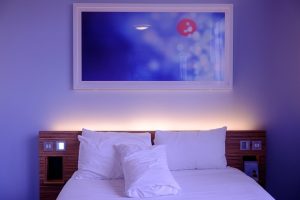Are you struggling to get a good night’s sleep? Do you often wake up feeling tired and groggy, no matter how long you slept? You’re not alone. Millions of people around the world suffer from sleep problems, ranging from insomnia to restless leg syndrome.
I know firsthand how important quality sleep is for our overall wellbeing. That’s why I’ve spent years researching advanced techniques for improving sleep quality.
In this article, I’ll share some of my top tips and tricks for managing insomnia, reducing stress, and boosting REM sleep. Whether you’re a chronic insomniac or simply looking to improve your sleep habits, these strategies can help you achieve deep, restful slumber every night.
Understanding The Science Of Sleep
 Sleep is a mysterious and wondrous experience that we all have the privilege of experiencing every day. It’s like a magical journey where our minds get to take a break from reality and enter an entirely new dimension.
Sleep is a mysterious and wondrous experience that we all have the privilege of experiencing every day. It’s like a magical journey where our minds get to take a break from reality and enter an entirely new dimension.
The brain waves that occur during sleep are unlike any other, and they play a crucial role in ensuring that we get the rest we need to function optimally.
One of the key factors that regulate our sleep patterns is our circadian rhythm. This internal biological clock dictates when we feel sleepy or awake and influences our overall sleep quality. When this rhythm is disrupted, it can lead to insomnia, difficulty falling asleep, or staying asleep throughout the night.
As sleep health experts or specialists, it’s essential to understand the science behind sleep so that we can help others achieve better rest.
By delving into the complexities of brain waves and circadian rhythms, we can identify ways to improve overall sleep hygiene for ourselves and others.
With this knowledge in hand, we can create targeted strategies for managing insomnia, boosting REM sleep, and ultimately helping people get the most out of their time asleep.
Creating A Sleep-Conducive Environment
Creating a Sleep-Conducive Environment is essential for improving sleep quality. Your bedroom should be a sanctuary where you feel relaxed and comfortable, allowing your mind and body to drift off into restful sleep.
To achieve this, you need to focus on two key factors: Sleep hygiene practices and bedroom design elements.
Sleep hygiene practices refer to the habits and behaviors that promote good sleep. These include maintaining a regular sleep schedule, avoiding caffeine and alcohol before bedtime, limiting screen time in the evening, and creating a relaxing bedtime routine. By incorporating these practices into your daily routine, you can train your body to recognize when it’s time to sleep, making it easier to fall asleep quickly and stay asleep throughout the night.
Bedroom design elements also play a crucial role in creating a sleep-conducive environment. You want your bedroom to be quiet, dark, cool, and comfortable. Use blackout curtains or an eye mask to block out any light that might disrupt your sleep. Keep the temperature between 60-67 degrees Fahrenheit for optimal sleeping conditions. Choose bedding that is soft and breathable, such as cotton or bamboo sheets.
In addition to these fundamental design elements of your bedroom space:
- Consider using aromatherapy with soothing scents like lavender or chamomile.
- Use white noise machines or calming music to block out any outside noise.
- Invest in high-quality pillows that provide proper support for your neck and head.
By optimizing both Sleep hygiene practices and bedroom design elements together, you can create an ideal environment for restful sleep every night. Remember that everyone’s needs are different when it comes to sleeping preferences; however, by focusing on these fundamentals of good sleep hygiene behaviors combined with effective bedroom design elements, anyone can achieve better quality of restful slumber.
Applying Relaxation Techniques To Combat Insomnia
Sleep is like a puzzle, and each piece needs to fit perfectly to achieve a restful night. Insomnia is one of the most common sleep disorders, affecting millions of people worldwide. It can be caused by stress, anxiety, or other underlying medical conditions.
The good news is that there are several relaxation techniques that can help combat insomnia and improve sleep quality. Meditation techniques have been proven to be effective in managing insomnia. Meditation involves focusing on your breathing and clearing your mind of any distractions. This technique helps reduce stress levels, which can contribute to insomnia. Practicing meditation for even just a few minutes before bedtime can help calm the mind and promote relaxation.
Herbal remedies have also been used for centuries to aid in sleep quality. Chamomile tea is a natural sedative that can reduce anxiety and promote relaxation. Lavender oil has also been shown to have calming effects on the body when inhaled or applied topically before bed. Incorporating these herbal remedies into your bedtime routine may improve your ability to fall asleep and stay asleep throughout the night.
By incorporating relaxation techniques such as meditation and herbal remedies into your routine, you may find relief from insomnia and achieve better sleep quality overall. It’s important to remember that everyone’s journey with sleep is unique, so finding what works best for you may take some trial and error. Keep experimenting until you find what fits perfectly into your puzzle of achieving restful nights of sleep!
Incorporating Exercise Into Your Sleep Routine
Exercise has long been known to have a positive impact on overall health and well-being. But did you know that incorporating exercise into your daily routine can also improve your sleep quality? It’s true! By adding a few simple exercises to your bedtime routine, you can help relax your body and prepare it for a restful night’s sleep.
One effective way to incorporate exercise into your sleep routine is by practicing bedtime stretching. This involves gentle stretching exercises before bed to help loosen up any tight muscles that may be causing discomfort throughout the night. Some great stretches include hamstring stretches, hip flexor stretches, and shoulder stretches.
By taking just a few minutes each night to stretch before bed, you’ll find yourself feeling more relaxed and comfortable as you drift off to sleep. Another technique to try is post-workout relaxation techniques. After finishing up your daily workout routine, take some time to wind down and relax before heading off to bed.
This could include activities such as meditation or deep breathing exercises, which are proven methods for reducing stress and promoting relaxation. By allowing yourself some time to unwind after exercising, you’ll be better able to transition into a peaceful state of mind for a good night’s rest.
Incorporating exercise into your sleep routine doesn’t have to be complicated or time-consuming. With just a few simple techniques like bedtime stretching and post-workout relaxation, you can enjoy improved sleep quality and wake up feeling refreshed and energized each day. So why not give it a try? Your body (and mind) will thank you for it!
Maximizing Rem Sleep For Optimal Rest And Recovery
REM sleep is a crucial phase of the sleep cycle that allows our body to recover and rejuvenate. Rapid Eye Movement (REM) sleep is the stage where most of our dreaming occurs, and it plays a vital role in memory consolidation, learning, and emotional regulation. Therefore, it is essential to maximize REM sleep duration to ensure optimal rest and recovery.
One way to improve REM sleep quality is by taking supplements that promote relaxation, such as melatonin or magnesium. These supplements help calm the mind and body, making it easier to fall asleep and enter the REM phase. However, it’s essential to speak with a healthcare professional before taking any new supplements.
Another technique that can help maximize REM sleep is dream journaling. Keeping a dream journal near your bed can help you record your dreams every morning before getting up. This practice helps increase awareness of your dreams and encourages lucid dreaming, which can lead to more vivid dreams during the REM phase.
In summary, optimizing REM sleep plays a critical role in achieving optimal rest and recovery. Incorporating techniques such as taking supplements or dream journaling can significantly improve the quality of your REM sleep. By prioritizing this essential phase of the sleep cycle, you can wake up feeling refreshed and ready to tackle whatever challenges come your way throughout the day.
What Is The Ideal Temperature For A Sleep-Conducive Environment?
I often get asked about the ideal temperature for a sleep-conducive environment.
The optimal temperature for a good night’s rest is between 60-67 degrees Fahrenheit. This temperature range helps facilitate the body’s natural cooling process, which is crucial to falling asleep and staying asleep throughout the night.
Additionally, proper sleep environment design plays an essential role in getting quality sleep. This includes optimizing lighting, reducing noise levels, and selecting comfortable bedding and pillows.
By creating a comfortable sleep environment with an optimal temperature, you can improve your sleep quality and wake up feeling refreshed and rejuvenated each morning.
Can Drinking Alcohol Before Bed Improve Sleep Quality?
Ah, the age-old question: can a nightcap improve your sleep quality?
The short answer is no, but I suppose I should elaborate.
While alcohol may initially make you feel drowsy and relaxed, it actually disrupts the later stages of sleep and causes more frequent awakenings throughout the night.
In fact, studies have shown that alcohol consumption before bed can decrease REM sleep and increase light sleep, leaving you feeling less rested in the morning.
So what are some alternatives to drinking before bed?
Consider practicing relaxation techniques like meditation or deep breathing exercises, establishing a consistent sleep schedule, and creating a comfortable sleeping environment free from distractions.
Trust me, your body (and liver) will thank you for skipping the booze.
How Many Hours Of Sleep Do I Need To Achieve Optimal Rest And Recovery?
To achieve optimal rest and recovery, it is important to understand the importance of sleep tracking and circadian rhythm.
Sleep tracking can provide valuable insights into your sleep patterns and help identify any areas for improvement.
Additionally, maintaining a consistent sleep schedule in line with your circadian rhythm can also promote better quality sleep.
It is recommended that adults aim for 7-9 hours of sleep per night, but individual needs may vary based on factors such as age and activity level.
Monitoring your sleep habits and making adjustments as needed can lead to more restful and refreshing sleep.
Are There Any Specific Foods Or Supplements That Can Improve Rem Sleep?
I am often asked about the best foods and supplements to improve REM sleep. Let me tell you, it’s like finding a needle in a haystack!
But fear not, there are certain foods that can promote this crucial stage of sleep such as salmon, walnuts, and kiwis. Additionally, supplements like melatonin and valerian root have been shown to aid in insomnia management which ultimately leads to better REM sleep.
It’s important to remember that while these options may help, they should be used in conjunction with other healthy sleep habits for optimal results.
Can Taking Naps During The Day Affect The Quality Of Nighttime Sleep?
Power napping benefits are well-known, but many people are concerned about how taking daytime naps might affect their nighttime sleep.
The truth is that power napping for a short period of 20-30 minutes can actually improve sleep quality at night.
However, sleeping for longer periods during the day or too close to bedtime can disrupt the natural circadian rhythm and make it harder to fall asleep at night.
If you want to take a nap during the day, it’s best to do so earlier in the afternoon and limit your nap time to no more than 30 minutes.
Maintaining a consistent daytime sleep schedule can also help regulate your body’s clock and promote better sleep at night.
Well folks, it’s time to put all those sleep myths to bed. Let’s start with the idea that alcohol before bed is a surefire way to improve your sleep quality. Sorry to burst your bubble, but alcohol actually disrupts your REM sleep, leaving you feeling groggy and unfocused in the morning.
Another common misconception is that naps during the day will ruin your nighttime sleep. But fear not, my sleepy friends, because research shows that short power naps can actually boost your alertness and productivity throughout the day without affecting the quality of your nighttime slumber. So go ahead and take that midday snooze, just keep it under 30 minutes.
Now let’s talk about food and supplements for better REM sleep. While there are some foods and supplements that may have a positive impact on our overall health, there is no magic pill or potion that will guarantee better REM sleep. And let’s be real, if there was, we’d all be sleeping like babies every night.
So what can we do to improve our sleep quality? Well, it starts with creating a comfortable environment – think cool temperatures and minimal distractions – and establishing a consistent bedtime routine.
And if you’re struggling with insomnia or other sleep disorders, seek professional help from a healthcare provider who specializes in sleep medicine. Sweet dreams!









